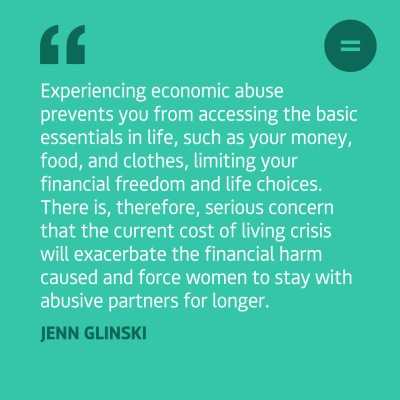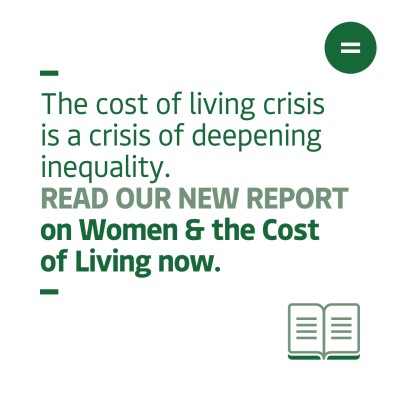Engender blog
GUEST BLOG: Economic Abuse and the cost of living crisis

As part of our guest blog series on the cost of living crisis, researcher Jenn Glinski explores how the current rise in costs is impacting victim-survivors of economic abuse.
Content warning: This blog discusses different forms of domestic abuse and their impact.
The current cost of living crisis and the difficult decision to ‘heat or eat’ is one that victim-survivors of economic abuse are all too familiar with. However, unlike the government-imposed crisis that the rest of the country has been subjected to, the daily cost of living crisis victim-survivors experience is deliberately forced upon them by their abusive (ex)partners. Experiencing economic abuse prevents you from accessing the basic essentials in life, such as your money, food, and clothes, limiting your financial freedom and life choices. There is, therefore, serious concern that the current cost of living crisis will exacerbate the financial harm caused and force women to stay with abusive partners for longer.
Delivering Equally Safe: Challenging and eradicating violence against women
-400.png)
To mark the annual 16 Days of Activism campaign, our Policy Officer for Engender's Delivering Equally Safe project, Hannah Brisbane, shares some background on our briefing for MSPs on the importance of primary prevention in challenging and eradicating men's violence against women.
We are currently in the middle of the 16 Days of Activism against Gender-Based Violence. This annual campaign runs from the International Day for the Elimination of Violence against Women on the 25th of November until the 10th of December, which is Human Rights Day.
The cost of living crisis and women: read our new report

Today Engender has released a report setting out how the deepening cost of living crisis will have a devastating impact both on different groups of women in Scotland, and on women's equality as a whole. Covering issues including fuel costs, unpaid care, housing, women's safety, mental health and social security, the report details how marginalised women will be disproportionately affected by this latest cost of living crisis. We make recommendations for immediate action to ensure that Scottish Government policy and budgetary responses to the cost of living do not risk entrenching gender inequality even more deeply in Scotland.
Crisis after Crisis, women pay the price
Women, particularly those facing intersecting marginalisation, pay the price in times of crisis because there is very little safety net when the fault lines of deep inequality in the UK are exposed. This is largely due to of a gendered ‘crisis of incomes’ across the UK that ensures women do not have equal access to financial resources compared with men. The egregious impact of the Covid-19 pandemic has already placed women at greater risk of economic insecurity, and the current cost of living crisis will further exacerbate women’s existing economic inequality, pushing many into poverty.
Higher prices, lower income, less security
While many people across Scotland are experiencing hardship as a result of the cost of living increases, women are far more likely to take responsibility for spending on children and purchasing non-durable items like food and domestic products that are susceptible to price hikes during periods of inflation. Alongside these increased costs, the UK Government decision not to uprate Universal Credit in line with inflation mean that hundreds of thousands of people in Scotland will experience a real terms income cut of £570 per year. Households impacted by the benefits cap face even more severe losses. Women are the majority of those on Universal Credit and impacted by the benefit cap.
Women make up the majority of many groups with high energy needs, including older people, disabled people, unpaid carers, and those looking after children in the home, and are also the majority of those in temporary work and on zero-hours contacts in Scotland. Soaring energy bills for households and business will therefore have a disproportionate impact on women, both as the managers of increasingly tight household budgets, and as those first in line to face unemployment, underemployment or the negative mental health impacts associated with precarious work.
Cost of Living Crisis: The financial impact on women's access to housing
-400.png)
As part of our blog series on the cost of living crisis, Dr Melissa Espinoza looks at how a national/global crisis can exacerbate existing barriers for specific populations, and how the current financial crisis interacts with women's experiences of housing and homelessness.
When discussing the financial crisis, we must consider the difficulties of often overlooked populations. For some, the financial crisis will be a temporary and challenging time, but not a long-term way of living. Many people had already long been struggling to survive. They were already operating in crisis mode before the financial crisis. For many, the financial and housing rental crises have been years in the making.
Covid-19 is a clear example of how a national/global crisis can exacerbate existing barriers for specific populations. In other words, an increased cost of living always hits the poorest first and hardest. According to a recent report by the Women’s Budget Group (WBG), “[o]ver a decade of austerity policies, low wage rises and cuts to social security have left many people in poverty. While the richest households saved money during the pandemic, the poorest fell further into debt, with no cushion to cope with rising prices now.” Hence, many bought new homes while many people also could no longer afford their rents during the pandemic. The media conversations about the cost of living focus on households who are newly experiencing financial burdens due to the cost of living rises. However, many renters and people living in temporary accommodations struggle to keep a roof over their heads and escape the cycle of living paycheck to paycheck. Even more difficult would be for people to move into affordable accommodation after experiencing homelessness.
Cost of Living Crisis: Another Catastrophe, The Same Shoulders
-400.png)
As part of our blog series on the cost of living, unpaid carer Lynn Williams reflects on the crisis and why government responses bake in further inequality and marginalization. The same shoulders bear the burdens of economic and public policy failures and we cannot allow this to continue, she writes.
It’s hard to know where to start when everything seems so devastatingly awful and overwhelming.
Covid is not over – despite what you might be hearing. And running alongside that ongoing, hellish crisis, there’s another public health and societal disaster in the making.
The “cost of living crisis” is such a misnomer – it’s not a crisis, it’s catastrophic. It’s not a future event – it’s ripping lives apart now.
As I write this, I’m trying not to hyperventilate at the prospect of five figure energy bills; as you read this, you’re probably working out what the heck you cut or stop doing as price rises continue to annihilate your monthly budget. You’re wondering how to keep your disabled child safe and warm; you’re wondering what you can cut back on to ensure that the person you care for has food and the care they need to stay at home.
Downloads
 Engender Briefing: Pension Credit Entitlement Changes
From 15 May 2019, new changes will be introduced which will require couples where one partner has reached state pension age and one has not (‘mixed age couples’) to claim universal credit (UC) instead of Pension Credit.
Engender Briefing: Pension Credit Entitlement Changes
From 15 May 2019, new changes will be introduced which will require couples where one partner has reached state pension age and one has not (‘mixed age couples’) to claim universal credit (UC) instead of Pension Credit.
 Engender Parliamentary Briefing: Condemnation of Misogyny, Racism, Harassment and Sexism
Engender welcomes this Scottish Parliament Debate on Condemnation of Misogyny, Racism, Harassment and Sexism and the opportunity to raise awareness of the ways in which women in Scotland’s inequality contributes to gender-based violence.
Engender Parliamentary Briefing: Condemnation of Misogyny, Racism, Harassment and Sexism
Engender welcomes this Scottish Parliament Debate on Condemnation of Misogyny, Racism, Harassment and Sexism and the opportunity to raise awareness of the ways in which women in Scotland’s inequality contributes to gender-based violence.
 Gender Matters in Social Security: Individual Payments of Universal Credit
A paper calling on the Scottish Government to automatically split payments of Universal Credit between couples, once this power is devolved to the Scottish Parliament.
Gender Matters in Social Security: Individual Payments of Universal Credit
A paper calling on the Scottish Government to automatically split payments of Universal Credit between couples, once this power is devolved to the Scottish Parliament.
 Gender Matters Manifesto: Twenty for 2016
This manifesto sets out measures that, with political will, can be taken over the next parliamentary term in pursuit of these goals.
Gender Matters Manifesto: Twenty for 2016
This manifesto sets out measures that, with political will, can be taken over the next parliamentary term in pursuit of these goals.
 Scottish NGO Briefing for UN Special Rapporteur on Violence Against Women
Joint briefing paper for the UN Rapporteur on Violence Against Women.
Scottish NGO Briefing for UN Special Rapporteur on Violence Against Women
Joint briefing paper for the UN Rapporteur on Violence Against Women.

Newsletter
Sign up to receive our newsletter here:
Sign up to our mailing list
Receive key feminist updates direct to your inbox: